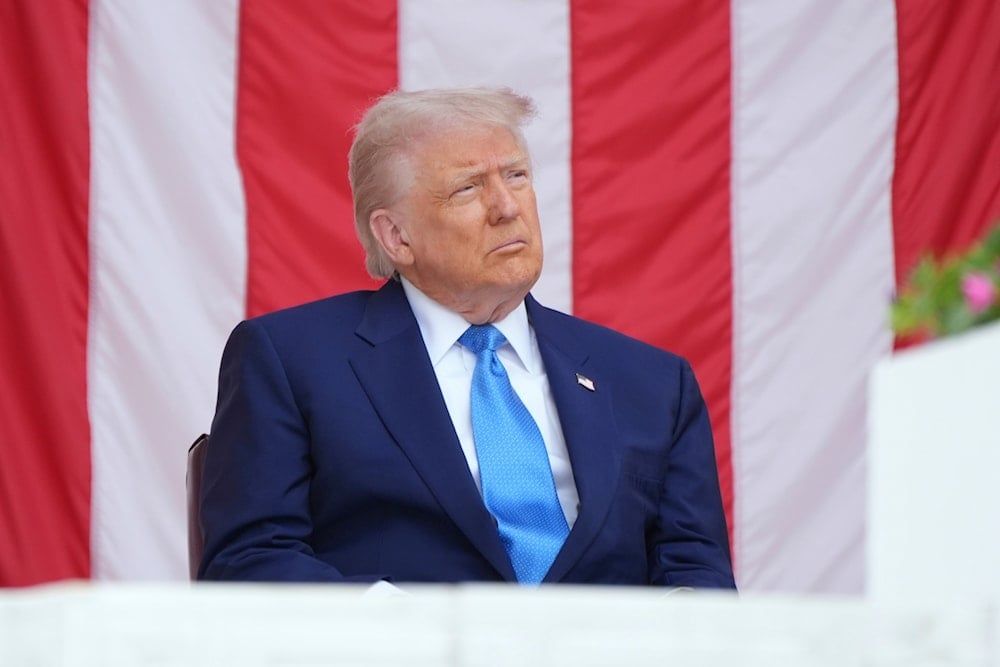Trump praises Xi, but says he's 'extremely hard' to make deals with
The US president is urgently seeking a phone call with the Chinese president to revive trade talks amid rising tensions.
-

US President Donald Trump listens during the 157th National Memorial Day Observance at Arlington National Cemetery, Monday, May 26, 2025, in Arlington, Va (AP)
Chinese President Xi Jinping is tough and "extremely hard to make a deal with." With these words, Trump described his Chinese counterpart as trade talks between the two giants stall.
"I like President Xi of China, always have, and always will, but he is VERY TOUGH, AND EXTREMELY HARD TO MAKE A DEAL WITH," Trump said in a post on Truth Social.
Meanwhile, POLITICO reported yesterday that US President Donald Trump is urgently seeking a phone call with Chinese President Xi Jinping this week in a bid to revive momentum toward a new trade agreement, according to sources familiar with the matter. Trump’s renewed push comes as Washington faces mounting pressure over China’s restrictions on critical mineral exports essential to US manufacturing and defense.
The White House confirmed that a call between Trump and Xi is “likely", though officials have not finalized the timing. As POLITICO reported, Trump has become “obsessed” with securing the call, believing a direct conversation with Xi is the only way to untangle an increasingly fragile $600 billion trade relationship without damaging his political standing at home.
“The president is obsessed with having a call with Xi,” one source told POLITICO. “He believes he can break the deadlock himself.” However, the same source added that the administration is feeling acute pressure after Beijing’s decision to slow or halt shipments of rare earth minerals and magnets, which are vital to key US industries, including auto manufacturing and military production.
Despite the administration’s hopes, observers caution that Xi Jinping may not be eager to engage. “I don’t think Xi is too interested in exporting any more rare earths or magnets to the United States; he’s made his position clear,” the source said. Nevertheless, they noted that Xi would likely accept Trump’s call, albeit with reservations.
White House under pressure over China’s rare earth restrictions
According to POLITICO, senior officials believe Trump retains some leverage, but there’s internal debate over whether it’s the right time to apply maximum pressure. “The president feels like a call between principals is a way to cut through the noise and get to the heart of the matter,” said a former Trump aide.
Yet the optics may not favor Washington. Daniel Russel, who served as assistant secretary of state for East Asian and Pacific Affairs under Barack Obama, told POLITICO that Trump’s eagerness signals weakness to Beijing. “China has a sharp nose for weakness, and for all his bravado, Trump is signaling desperation,” he said. “That only stiffens Beijing’s resolve.”
Beijing's hesitance may also stem from Trump’s unpredictable style. According to National Security Council China advisor Rush Doshi, China’s leadership is wary of placing Xi in potentially embarrassing or unscripted high-level talks. “It’s not usual practice for PRC diplomats to put the leader at risk of a potentially embarrassing or unpredictable encounter,” Doshi told POLITICO.
China’s discomfort has reportedly been exacerbated by Trump’s recent public clashes with leaders such as Ukraine’s Volodymyr Zelensky and South Africa’s Cyril Ramaphosa. In contrast, Chinese officials prefer tightly choreographed diplomacy, especially when it involves Xi.
New tariff agreement falters as fentanyl, minerals remain sticking points
The renewed urgency for Trump-Xi trade deal talks comes just weeks after both countries signed a temporary tariff relief agreement. Under the deal, the US agreed to lower tariffs from 145% to 30%, while China reduced its own to 10% and committed to easing restrictions on mineral exports.
However, as Trump officials have noted, follow-through from Beijing has been uneven.
Appearing on CNBC, US Trade Representative Jamieson Greer said, “They removed the tariff like we did. But some of the countermeasures, they’ve slowed on.”
A business official told POLITICO that fentanyl-related negotiations now serve as a key gateway for future tariff progress, but the US has yet to respond to two proposals from Beijing on the issue.
Observers doubt Xi will engage beyond symbolic gestures
The proposals reportedly outline steps Beijing could take to limit precursor chemicals used in fentanyl production, which the US has demanded. Yet many inside the Trump administration doubt that China would follow through on enforcement. Former US trade representative Harry Broadman, who served under Bill Clinton and George H.W. Bush, told POLITICO that Trump’s strategy may not work.
“Trump is a deal maker, but Xi is not,” Broadman said. “He’s a Party guy at the top of an administrative superstructure. I cannot imagine that Xi would get into specifics—at most, they might agree on certain principles, but that’s not likely to satisfy Trump.”

 5 Min Read
5 Min Read









